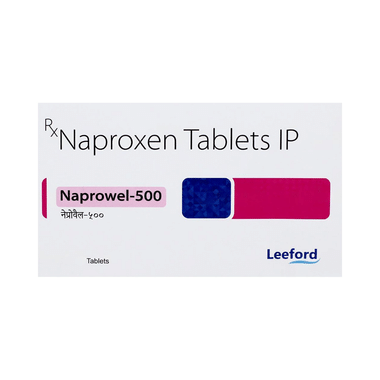Cronta 500mg Tablet
 Prescription Required
Prescription Required

Product introduction
Cronta 500mg Tablet should be taken with food to avoid stomach upset and reduce side effects. In general, you should try to use the smallest amount necessary to control your symptoms, for the shortest possible time. You should take this medicine regularly while you need it. Try not to miss doses as it will become less effective if you do.
The most common side effects of this medicine include indigestion, abdominal pain, nausea, headache, rash, bruises, and edema. If any of these side effects do not resolve with time or get worse, you should let your doctor know. Your doctor may be able to suggest ways of preventing or reducing the symptoms.
This medicine is generally considered safe but is not suitable for everybody. Before you take it, you should tell your doctor if you have kidney problems, asthma, blood disorders, or drink a lot of alcohol. Also, tell your doctor what other medicines you are taking to make sure you are safe. It is best to avoid drinking alcohol while using this medicine.
Uses of Cronta Tablet
Benefits of Cronta Tablet
In Pain relief
Take it as it is prescribed to get the most benefit. Do not take more or for longer than needed as that can be dangerous. In general, you should take the lowest dose that works, for the shortest possible time. This will help you to go about your daily activities more easily and have a better, more active, quality of life.
Side effects of Cronta Tablet
Common side effects of Cronta
- Indigestion
- Abdominal pain
- Nausea
- Headache
- Rash
- Bruise
- Edema (swelling)
How to use Cronta Tablet
How Cronta Tablet works
Safety advice
What if you forget to take Cronta Tablet?
All substitutes
Quick tips
- You have been prescribed Cronta 500mg Tablet to relieve pain and inflammation.
- Take it with food or milk to prevent upset stomach.
- Take it as per the dose and duration prescribed by your doctor. Long term use may lead to serious complications such as stomach bleeding and kidney problems.
- Do not take indigestion remedies (antacids) within two hours of taking Cronta 500mg Tablet.
- Avoid consuming alcohol while taking Cronta 500mg Tablet as it can increase your risk of stomach problems.
- Inform your doctor if you have a history of heart disease or stroke.
- Your doctor may regularly monitor your kidney function, liver function and levels of blood components if you are taking this medicine for long-term treatment.
Fact Box
Interaction with drugs
Patient concerns
FAQs
Does Cronta 500mg Tablet help with pain?
Can I take Cronta 500mg Tablet for a sinus infection?
Does Cronta 500mg Tablet raise blood pressure?
Does Cronta 500mg Tablet cause constipation?
Does Cronta 500mg Tablet contain sulfa?
Is Cronta 500mg Tablet a controlled substance?
Is Cronta 500mg Tablet addictive?
Is Cronta 500mg Tablet safe?
Is Cronta 500mg Tablet a narcotic?
Is Cronta 500mg Tablet safe in pregnancy?
Is Cronta 500mg Tablet a blood thinner?
Is Cronta 500mg Tablet good for headaches?
Is Cronta 500mg Tablet over the counter?
Can I take Cronta 500mg Tablet with oxycodone?
Can I take Cronta 500mg Tablet with prednisone?
Can I take Cronta 500mg Tablet for cramps (painful periods)?
Can I take Cronta 500mg Tablet for fever?
Can I take Cronta 500mg Tablet for back pain?
Can I take Cronta 500mg Tablet for a cold?
Can I take Cronta 500mg Tablet for a hangover?
Can I take Cronta 500mg Tablet for gallbladder pain?
Can I take Cronta 500mg Tablet for tonsillitis?
Can I take Cronta 500mg Tablet for urinary tract infection (UTI)?
Can I take Cronta 500mg Tablet for a toothache (dental pain)?
Does Cronta 500mg Tablet make you sleepy?
Does Cronta 500mg Tablet work immediately?
Does Cronta 500mg Tablet expire?
Does Cronta 500mg Tablet have aspirin in it?
Does Cronta 500mg Tablet get you high?
Does Cronta 500mg Tablet work?
Can I take Cronta 500mg Tablet for the treatment of flu?
Can I take Cronta 500mg Tablet for swollen glands?
Disclaimer:
Tata 1mg's sole intention is to ensure that its consumers get information that is expert-reviewed, accurate and trustworthy. However, the information contained herein should NOT be used as a substitute for the advice of a qualified physician. The information provided here is for informational purposes only. This may not cover everything about particular health conditions, lab tests, medicines, all possible side effects, drug interactions, warnings, alerts, etc. Please consult your doctor and discuss all your queries related to any disease or medicine. We intend to support, not replace, the doctor-patient relationship.References
- Furst DE, Ulrich RW, Varkey-Altamirano C. Nonsteroidal Anti-Inflammatory Drugs, Disease Modifying Antirheumatic Drugs, Nonopioids Analgesics, & Drugs Used in Gout. In: Katzung BG, Masters SB, Trevor AJ, editors. Basic and Clinical Pharmacology. 11th ed. New Delhi, India: Tata McGraw Hill Education Private Limited; 2009. p. 628.
- Grosser T, Smyth E, FitzGerald GA. Anti-Inflammatory, Antipyretic, and Analgesic Agents; Pharmacotherapy of Gout. In: Brunton LL, Chabner BA, Knollmann BC, editors. Goodman & Gilman’s: The Pharmacological Basis of Therapeutics. 12th ed. New York, New York: McGraw-Hill Medical; 2011. pp. 988-89.
- Briggs GG, Freeman RK, editors. A Reference Guide to Fetal and Neonatal Risk: Drugs in Pregnancy and Lactation. 10th ed. Philadelphia, PA: Wolters Kluwer Health; 2015. pp. 955-58.
Marketer details
Lab tests offered by us







